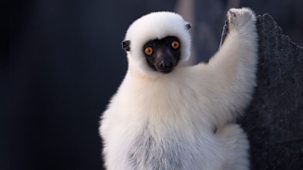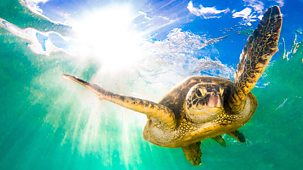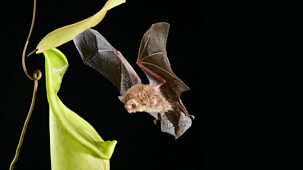
Series 1: 1. Madagascar
Journey across the tropical island of Madagascar and explore the unique and incredible wildlife it has to offer - from its famed lemurs to chameleons. \n\nAs the oldest island on earth, life has had time to evolve, and there are now more unique plants and animals on Madagascar than any other island.\n\nIt was formed nearly 90 million years ago when a giant landmass split apart, and Madagascar was cast adrift from east Africa. Braving the 400-mile ocean crossing from Africa, the first castaways arrived on the arid west of the island, and were met with vast deserts. \n\nRing-tailed lemurs are the direct descendants of one of the very first mammals to arrive, and they are thriving despite the arid conditions. They spend up to eight hours a day foraging in the Spiny Forest. Their plant-based diet includes plants with caustic sap that would burn human skin.\n\nWhen humans arrived on the west coast, they too faced the hostile desert, high temperatures and droughts that can last a year. In the village of Ampotaka, the people have learnt to use baobab trees to help them survive. The trees grow up to 30 metres high and stores vast quantities of water in their trunks. By hollowing out the inside of the trunk, the people create huge water tanks storing thousands of litres of water, which they can use when times are tough.\n\nTiny labord’s chameleons are unique to Madagascar and have the shortest lifespan of any land vertebrate – living for just four months. They time their hatching with the start of the rainy season when the going is good, and then the race is on for them to grow, mate and lay eggs before the dry season comes round once again.\n\nOne of the most dramatic places in Madagascar is known as the Grand Tsingy – 500 square miles of sharp limestone pinnacles sheltering small pockets of forest. To survive here, Decken’s sifakas must climb these shards of rock, sharp enough to shred human skin, and leap 30 feet between them.\n\nA series of even higher peaks forms a mountainous spine running down the middle of Madagascar. Just a few thousand years ago, human settlers from Asia brought the skills to turn the steep mountainsides into rice paddies. By digging terraces into the slopes, even the steepest gradients can be farmed, producing more than a million tonnes of rice every year. But only if they can keep their crop safe from the devastating plagues of locusts in their billions.\n\nMadagascar’s mountain range defines the islands’ climate. It blocks warm, wet air blown in off the Indian Ocean to the east, creating the arid deserts of the west. But keeping all this moisture to the eastern side of the island makes rainfall high there, and this creates bountiful rainforests.\n\nMost of the island’s incredible wildlife can be found within these tropical rainforests, including tenrecs, Madagascar’s own unique version of a hedgehog. They give birth to more babies than any mammals – as many as 32 in a litter. The streaked tenrec rubs together modified spines on her back to make a squeaking noise to warn all her babies of danger.\n\nThe extraordinary pelican spider twangs the threads of an orb web spider to lure it into its giant jaws. The aye-aye is one of Madagascar’s weirdest creatures, found hunting for insect larvae at night. It uses it bizarre 9cm-long middle finger to tap tree branches for hollow bits, before scraping away the bark and deploying its super-sized finger to fish out the grubs.\n\nMadagascar’s unique wildlife has slowly been evolving for millions of years, but since humans arrived the pace of change has been faster than many animals can cope with. As little as 20 per cent of the island’s original forest remains, and 95 per cent of lemurs are now threatened with extinction.\n\nThe greater bamboo lemur is a story of how efforts to protect Madagascar’s wildlife can save a species from being wiped out entirely. These lemurs were thought to have gone extinct, thanks to the clearance of the bamboo forests they rely on for food. The bamboo lemurs are now protected and in the last year, a record number of babies were born. Madagascar is at a critical point, but with the right efforts, there is some hope for its wildlife in the future.
Source: BBC 2
Most recent episodes of Earth’s Tropical Islands
Earth’s Tropical Islands
Series 1: 3. Hawaii
This is a journey across Hawaii’s varied islands, discovering how they were made and the incredible wildlife that thrives there. \n\nHawaii is the most remote island chain ...
09-07-2025
BBC 2
Earth’s Tropical Islands
Series 1: 2. Borneo
In the heart of south east Asia lies the tropical island of Borneo. Twice the size of the British Isles, it is the third largest island on earth and home to possibly the greates ...
08-07-2025
BBC 2
Earth’s Tropical Islands
Series 1: 1. Madagascar
Journey across the tropical island of Madagascar and explore the unique and incredible wildlife it has to offer - from its famed lemurs to chameleons. \n\nAs the oldest island o ...
07-07-2025
BBC 2
Most popular episodes of Earth’s Tropical Islands
Earth’s Tropical Islands
Series 1: 3. Hawaii
This is a journey across Hawaii’s varied islands, discovering how they were made and the incredible wildlife that thrives there. \n\nHawaii is the most remote island chain ...
09-07-2025
BBC 2
Earth’s Tropical Islands
Series 1: 1. Madagascar
Journey across the tropical island of Madagascar and explore the unique and incredible wildlife it has to offer - from its famed lemurs to chameleons. \n\nAs the oldest island o ...
07-07-2025
BBC 2
Earth’s Tropical Islands
Series 1: 2. Borneo
In the heart of south east Asia lies the tropical island of Borneo. Twice the size of the British Isles, it is the third largest island on earth and home to possibly the greates ...
08-07-2025
BBC 2



